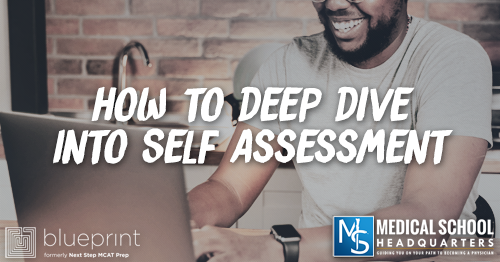Apple Podcasts | Google Podcasts
Session 313
Today, we dig into something a lot of people don’t pay enough attention to, and that is facing your weaknesses head-on.
We’re joined by Noor from Blueprint MCAT. If you would like to follow along on YouTube, go to premed.tv.
Listen to this podcast episode with the player above, or keep reading for the highlights and takeaway points.
[01:31] Overcoming Weaknesses on the MCAT: Why it Matters
The MCAT is a challenging exam that covers a diverse range of topics, each with its own set of requirements. However, despite the vastness of the exam, it’s essential not to neglect your weaknesses.
Our natural instinct is to focus on things that we’re good at while avoiding our weaknesses. Human psychology suggests that this behavior is rooted in the idea of conserving energy to survive until the next season or challenge. However, this approach can have negative consequences on MCAT performance.
Avoiding weaknesses in the MCAT can hurt your overall score and potentially impact medical school admissions. It’s crucial to identify your gaps in knowledge and dedicate ample time to improving those areas. Overcoming weaknesses is crucial to success on the MCAT exam.
With proper preparation and study, you can improve your weaker areas and perform better on test day. Remember, taking an honest assessment of your skills and working to improve them is the key to achieving your goals.
[03:04] Overcoming Struggles on the MCAT
Noor’s Journey
Are you struggling with a particular topic on the MCAT? You’re not alone. For Noor, physics was a challenging subject, and for many, Physics is a “trouble topic.”
Noor describes physics as the “bane of her existence” when reviewing full-lengths. She struggled to balance actual calculations with reasoning, which is essential in solving math-based problems in physics, chemistry, and other related subjects. At first, Noor was in denial about her struggles, but she knew that if she wanted a competitive score, she had to tackle her fears and weaknesses head-on.
'This is something that we do go over at Blueprint is balancing between actual calculations and reasoning, for example.'Click To TweetContent vs. Strategy
The first step Noor took was to determine whether her struggles were content-based or strategy-based. Sometimes, you may know the content well but struggle with the strategy required to answer questions. Other times, your struggles may be due to a lack of understanding of the content. Identifying the root cause of your struggles is essential in mapping out a plan to improve.
If your struggles are content-based, Noor recommends going back and reviewing the material, using flashcards, or other methods to solidify your knowledge. However, if your struggles are strategy-based, it’s essential to practice similar problems regularly and get out of your comfort zone. Getting questions wrong is part of the learning process, and it’s essential to accept this and continue practicing.
'Strategy takes time... you're not going to solidify strategy by reviewing a couple of modules or going over the content again. The only way to do that is to continue practicing similar problems.'Click To TweetAt the end of the day, identifying your weaknesses and taking proactive steps to overcome them is crucial to achieving success on the MCAT. Don’t give up, keep practicing, and remember that every mistake is an opportunity to learn and grow.
Overcoming Negative Thinking When Studying for the MCAT
In the beginning stages of studying for the MCAT, it’s common to fall into a negative spiral mindset where every incorrect answer feels like a reason for failure. It’s tempting to avoid difficult topics such as physics or chemistry and focus only on areas of strength, but this can hinder progress. While some may find comfort in certain subjects, others may struggle with them, like the CARS section, which is often a nightmare for many. It’s important to remember that every student has their own strengths and weaknesses, and seeking help from tutors or classmates can be beneficial.
[07:05] How to Know If You’re Having Trouble with Content vs. Strategy
When studying for the MCAT, it’s essential to identify whether your struggles are content-based or strategy-based. Pinpointing the root cause of your difficulties can help map out a plan for improvement.
Content-based struggles are easier to identify, as they stem from not knowing the material well enough or forgetting key concepts. In contrast, strategy-based struggles occur when you know the content but struggle with applying it effectively. This could be due to misinterpreting the question, making calculation errors, or applying concepts incorrectly.
'What makes the MCAT a tricky exam is it's not just content, it's also strategy. Can you apply the knowledge that you've learned?'Click To TweetIt’s important to analyze why you’re struggling and address the underlying issue. Seeking help from tutors or peers who excel in the subject can also be beneficial. Remember that the MCAT requires both content knowledge and strategic thinking, so it’s crucial to develop both to achieve success on the exam.
[09:53] Slowing Down Practice to Learn Strategy for the MCAT
When preparing for the MCAT, it’s easy to fall into the trap of rushing through practice problems to cover more ground. However, this approach can hinder progress with strategy development. To effectively absorb and apply strategy, it’s crucial to slow down in the beginning stages of practice.
For instance, in the CARS section, students often focus on timing instead of learning the necessary strategy. To combat this, Blueprint MCAT suggests taking untimed practice and fully absorbing the strategy. This involves identifying patterns in questions and answers, such as eliminating extreme answer choices or recognizing opinion-based questions.
Once comfortable with the strategy, students can begin picking up the pace and incorporating timing back into their practice. This investment of time and effort is crucial for solidifying both content and strategy, leading to more fruitful practice sessions in the long run.
[12:43] The Role of Psychology in MCAT Success
Ultimately, psychology plays a significant role in helping students succeed on the MCAT. It’s essential to identify areas of difficulty and determine whether they stem from content or strategy issues. If it’s a content problem, studying more and going at a steady pace is recommended.
However, if it’s a strategy issue, slowing down is crucial to internalize the necessary approach fully. But some students may associate slowing down with failure and resist it.
From a psychological perspective, it’s vital to find ways to encourage them to rest and take their time, even if it means “putting a cast” on their feet to prevent them from rushing past their challenges.
Failure is not fun, and Noor says this from personal experience. She had such crippling testing anxiety when she was studying for the MCAT. It was a scary exam, not just because it was intense and long, but because there was so much psychology involved.
Noor had to battle through feelings of impostor syndrome and every question she got wrong made her feel like that was my final determiner. But she learned from those failures. And that’s so much better than failing the real exam and having to retake it.
[14:23] Quantity vs. Quality
When it comes to studying for the MCAT, a lot of people think that quantity is more important than quality. But believe it or not, that’s not necessarily the case. Studying smartly and efficiently is key.
'With the MCAT, a lot of people think like, quantity is more important than quality... but that's not necessarily the case.'Click To TweetWhether you’re a full-time student or a full-time professional with other activities going on, studying efficiently is a must. You have to figure out what works best for you and your schedule.
Slowing down and analyzing what’s going on when you’re struggling with a particular topic is much more beneficial than doing endless amounts of questions without understanding the strategy behind them.
[17:52] Don’t Let Ego Get in the Way
It’s also important to not be afraid of failure. Take on these challenges and ask for help if needed. Don’t let your ego get in the way of your success.
The MCAT is an application test and it’s totally different from school. But learning how to apply content knowledge is a valuable skill to have, especially in medicine. It’s like riding a bike, you have to start with the basics and build up to become an expert.
'You have to study efficiently and smartly because if you don't, you're wasting your time.'Click To TweetFear of failure can be paralyzing, but it’s important to face those fears head-on and take on challenges. And asking for help is a smart and effective way to overcome obstacles and achieve success. Remember, we all have areas where we can improve, and there’s no shame in seeking assistance to achieve our goals.
It’s Okay to Slow Down
So, don’t be scared to slow down and take the time to study efficiently. It’s not an indication of your final score, in fact, it’s just a smart time investment for you. Remember, we’re here to help you succeed.
'It's okay to slow down. It's not an indication of your final score. In fact, it's just a very smart time investment for you.'Click To Tweet[19:06] Final Thoughts
As we discussed earlier, human psychology often prompts us to avoid the things we’re not good at or things that may make us feel bad about ourselves. This mindset often leads people to avoid taking diagnostic tests, as they fear their scores may not be ideal. However, embracing our weaknesses and facing our fears is vital to success.
While it may seem daunting, the first step towards progress is acknowledging our areas of improvement. So, I hope this discussion has been helpful for you in overcoming any reluctance towards facing your weaknesses head-on.
Remember, growth comes from learning and improvement, so don’t let fear hold you back.
Links:
SEARCH SITE
SEARCH SITE
LISTEN FOR FREE












